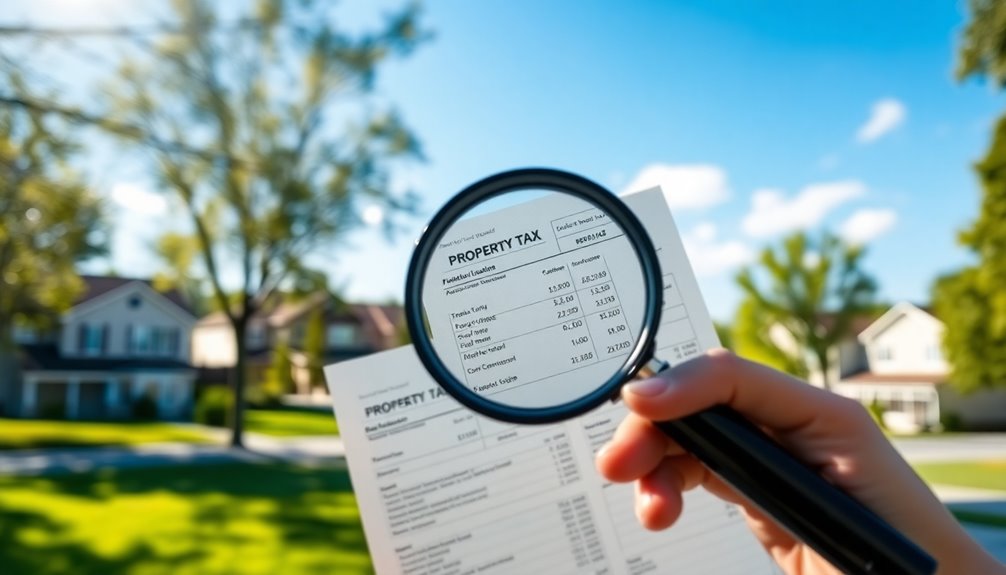To find the taxes owed on a property, start by gathering information about its location and assessed value. Research recent sales of similar properties to determine market value. Then, multiply this by your county's assessment ratio for the assessed value. Check for any exemptions that may lower your tax burden. Next, contact your local tax authority to obtain the current tax rate, typically expressed per $1,000 of assessed value. Finally, calculate your total tax by multiplying the assessed value by the tax rate. There's plenty more to explore about property taxes that could help you navigate this process more easily.
Key Takeaways
- Visit your local government's website to access property tax information and records specific to your property.
- Locate the property assessment roll, which includes details about assessed values and taxes owed.
- Use tax maps to identify your property's parcel number and related tax information.
- Contact your local tax assessor's office for assistance in obtaining current tax due amounts and payment options.
- Check for any exemptions or adjustments that may impact the total taxes owed on the property.
Understanding Property Tax Basics

When it comes to understanding property taxes, you're dealing with a crucial financial obligation that impacts your ownership experience. Property tax is an annual or semiannual charge levied by local governments and is paid by real estate owners within that jurisdiction. This tax helps fund essential local services, including schools, police, fire departments, and road construction.
Property taxes are considered ad-valorem taxes, meaning the amount you owe is a percentage of your property's assessed value. You'll find that taxes apply to various properties, including your primary residence, second homes, rental properties, and commercial spaces. Even tangible personal property, like business equipment and vehicles, may be taxed in many states. However, renters aren't responsible for property taxes; this obligation falls solely on property owners.
Local taxing units, such as school districts and counties, administer and collect these taxes. Each year, appraisal districts assess property values, and local governing bodies set the tax rates. All properties taxable unless specifically exempted by law, which is an important consideration for property owners.
Understanding these basics helps you navigate your responsibilities, ensuring you stay compliant and informed about the impact property taxes have on your overall financial health.
Calculating Taxable Assessment

Calculating your taxable assessment involves a few key steps that ensure you're accurately determining the amount of property tax you'll owe.
First, gather essential information about your property, such as its location, size, and any improvements made. Next, find the current market value by researching recent sales of similar properties in your area.
Once you have the market value, check your county's assessment ratio. This percentage is used to calculate your property's assessed value, so multiply the market value by this ratio. In North Carolina, property tax is assessed annually by local governments based on appraised value.
If you qualify for any exemptions, like a homestead exemption or senior citizen exemption, identify them and subtract their value from your assessed value to arrive at your taxable assessment.
Don't forget to understand local assessment practices, as these can impact your calculations. Review equalization rates and compare your assessed value with neighboring properties for fairness.
Finally, ensure that all your calculations align with local tax laws and document each step for future reference. By following these steps, you'll have a clear picture of your taxable assessment and be prepared to calculate the property tax owed.
Determining Property Tax Rates

Understanding property tax rates is essential for homeowners and investors alike, as it directly impacts your financial obligations.
To determine these rates, local assessors begin by estimating the assessed value of your property, which reflects its reasonable market value based on local real estate conditions. They often use methods like the sales comparison, income approach, or cost approach to arrive at this figure.
Keep in mind that the assessed value can be lower than the market value and varies between vacant land and improved properties.
The mill levy or tax rate is then calculated based on the total tax needed from property taxes divided by the total taxable assessed value in your area. Property taxes are a primary revenue source for local governments, so understanding how they are calculated can prevent surprises and lead to potential savings.
Usually expressed per $1,000 of assessed value, one mill represents $1 for every $1,000. Local budgets and spending priorities heavily influence these rates, as do revenues from other sources.
Finally, if you live in a region with multiple municipalities, tax levies are apportioned based on each area's assessed property values.
This ensures that you pay a fair share of local taxes, reflecting the value of your property within the community.
Navigating Local Authorities

Navigating local authorities can feel daunting, but knowing where to start makes the process much smoother. First, identify the local government responsible for property taxes in your area, which might be a city, town, village, or county. Each of these entities usually has a taxing authority that assesses and collects property taxes.
Be aware that local governments may also include school districts and special districts like water and sewer authorities.
Next, locate your property's assessment information. Assessments are based on the property's market value and are typically listed on an assessment roll, made public on a designated date. Tax maps are valuable tools that help you find your property's parcel number and coordinate locator number, making it easier to gather information.
Local assessors determine property values and may adjust assessed values annually. You can check your assessment on the tentative assessment roll to ensure its accuracy. Property tax is typically calculated by multiplying the assessed value of the property by the mill rate, which varies by locality and is determined by local government budgets.
Contesting Your Property Taxes

After you've gathered the necessary information from local authorities, you might find that your property's assessed value doesn't reflect its true market worth. To contest this, start by collecting evidence. Research recent sales of comparable properties to establish a benchmark for value. You can also obtain a professional appraisal for an independent opinion.
Review the assessment roll for errors, such as incorrect square footage or property classification, and document any unique features or defects that could affect your property's value. It is important to be aware of the deadlines for filing appeals in your jurisdiction, as they can vary significantly.
Next, prepare your appeal. Fill out the necessary forms like the RP-524 in New York or PT-311A in Georgia, ensuring you provide detailed information about your property. Include reasons why you believe the assessment is incorrect, backed by your evidence.
Choose a trier of fact, such as the Board of Equalization or Arbitration, depending on your area.
File your appeal within the specified deadline and pay any required fees. Be ready to attend a hearing to present your case.
After you submit the appeal, wait for the decision. If successful, your property's assessed value—and taxes—will drop; if not, consider further appeals to pursue a fair assessment.
Frequently Asked Questions
How Can I Find My Property's Assessed Value?
To find your property's assessed value, start by visiting your local county assessor's office website.
You can search using your property's address or parcel number. If you prefer, contact or visit the office in person for detailed assistance.
They'll provide insights into how the assessed value was determined and may offer an assessment report for a breakdown.
Don't forget to check your property tax bill, which usually lists the assessed value too.
What Should I Do if I Miss a Tax Payment?
If you miss a tax payment, act quickly. Pay the overdue amount as soon as you can to reduce penalties.
Contact your local government to understand the specific fees and penalties you'll face. Be aware of any redemption fees that might apply.
Keep an eye on notifications regarding your late payment, and make timely future payments to avoid legal actions.
Staying proactive helps you maintain your property and financial health.
Are Property Tax Rates the Same Everywhere?
No, property tax rates aren't the same everywhere. They vary significantly from state to state.
For instance, New Jersey has one of the highest rates at 2.08%, while Hawaii offers one of the lowest at 0.26%.
Local jurisdictions also influence rates, as cities and counties set their own.
This means your property tax burden can change dramatically based on where you live, so it's essential to check the rates applicable to your area.
How Often Are Property Assessments Updated?
Property assessments are updated at different frequencies depending on your area. Some places do it annually to keep up with market changes, while others opt for biennial updates, allowing assessors more time to gather data.
Significant changes, like renovations or new ownership, can trigger special updates. It's important to stay informed about your local assessment schedule, as it helps ensure fairness and accuracy in property values and taxes.
Can I Receive a Refund for Overpaid Property Taxes?
Yes, you can receive a refund for overpaid property taxes.
First, verify your overpayment through an online search or by contacting the treasurer's office. If you made duplicate payments or there's an appraisal correction, you're eligible.
You'll need to submit an Application for Refund along with supporting documents.
Keep in mind, refunds usually take six to eight weeks to process, so be patient while waiting for your money back.
Conclusion
In conclusion, finding the taxes owed on your property doesn't have to be overwhelming. By understanding the basics of property taxes, calculating your taxable assessment, and knowing the applicable tax rates, you can get a clear picture of your financial obligations. Don't hesitate to reach out to local authorities for assistance, and if you believe your taxes are too high, consider contesting them. Take control of your property tax situation and stay informed to avoid surprises!









